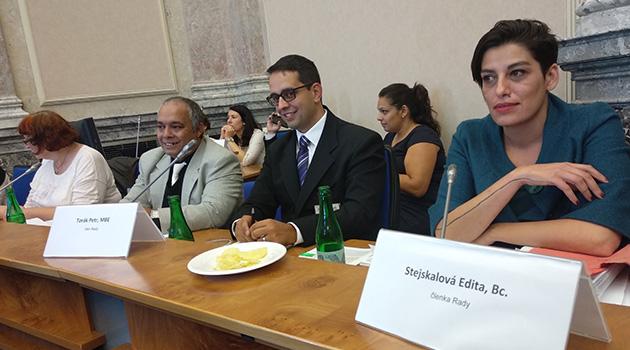Roma civil society members on Czech Govt Roma Council tell Labor Minister her anti-poverty measures will instead produce poverty

According to the civil society members of the Czech Government Council on Romani Minority Affairs, the Government’s “15 Measures to Combat Poverty” are actually just a response to the needs and wishes of local governments. They believe some of the measures contravene the Czech Republic’s own laws as well as its international human rights obligations.
The Czech Labor and Social Affairs Ministry, in the civil society members’ view, is disproportionately burdening the future budget of both the Czech state and the EU by deepening the housing crisis of a significant number of residents. “These measures will only deepen social exclusion, which goes against the basic meaning of the adopted Government Strategy. By failing to implement the Social Inclusion Strategy, the Czech Republic puts itself in the position of an unauthorized recipient of European subsidies and an untrustworthy partner for European institutions in social inclusion policy, thus jeopardizing further drawing of European funds into the social pillar,” reads the press release by the civil society members of the Czech Government Council on Romani Minority Affairs, which news server Romea.cz is publishing here in full translation.
Press release of the civil society members of the Czech Government Council on Romani Minority Affairs on the Labor Ministry’s “15 Measures to Combat Poverty”
In September of this year, Czech Labor and Social Affairs Minister Jana Maláčová (Czech Social Democratic Party – ČSSD) introduced the Government’s “15 Measures to Combat Poverty”. Seven ministries are meant to collaborate on implementing the measures.
The Czech Government’s “Strategy for Social Inclusion 2014-2020” (the “Strategy”) on that same issue focuses on fulfilling the aims the Czech Republic pledged to achieve as part of the European Union’s aims in the Europe 2020 Strategy. However, the 15 measures presented by the minister are rather just a response to the needs and wishes of municipalities, and in some cases, they contravene the Czech Republic’s own laws as well as its international human rights obligations.
One of the dominant conclusions of the measures is the creation of a new kind of housing benefit by combining two existing housing benefits into a single benefit that can be denied to those deemed initially eligible for it if they are not “active” enough after receiving it. Other plans presented as part of the measures involve beefing up public benefit jobs, measures in the area of debt relief through a bill drafted by the Justice Ministry, and increasing budgetary contributions to municipalities most afflicted by social exclusion.
In this context, we would like to remind the Labor Ministry that the Czech Republic ratified the European Social Charter in 1999, including its Additional Protocol providing for a system of collective complaints. The European Social Charter explicitly establishes the right to housing, and the ministry itself supposedly believes this human right can be deduced as applying to individuals in the context of the Czech Republic as well.
That, at least, is how the ministry expressed itself to the Constitutional Court on 21 June 2000 in a dispute about abolishing a Finance Ministry decree on the payment of rent and services associated with using a residential rental unit. The ministry has constantly presented that same conclusion until very recently, and for that reason, we believe that in the case of the measure under consideration here – making it possible to cancel an eligible person’s housing benefit – the human right to housing, which in this country is implemented solely through housing benefits, must not be forgotten.
Canceling an eligible person’s housing benefit could be interpreted as imposing an undue limitation on a right that is guaranteed to each individual according to international human rights treaties. Even worse, housing benefits under this scheme are potentially revocable for just some of the persons deemed eligible for them (the “less active”).
In other words, in practice, an otherwise neutral norm would impact two different groups of people differently. Here it is appropriate to remind the ministry that according to the case law of the European Court of Justice, if different rules are applied to comparable situations, or if the application of a rule differs according to different situations, that is considered to be either direct or indirect discrimination.
We recommend the ministry abandon this plan and submit a different proposal to take people’s “activity” into consideration, either through a different kind of benefit or under a different set of rules. The ministry has now established housing benefits for a limited period of time and conditioned their extension on the “activity” of the beneficiary.
The ministry should not condition the right to social benefits predominantly through sanctions (or rather, through sanctions based on collective guilt) but should create an incentive system where the individual’s / family’s active participation in education and participation in an active employment policy measure is a prime consideration in their initially qualifying for the benefit. Furthermore, conditions for debt relief for a wider range of people should be created, the administrative burden on employers in the event of their employees being subjected to collections should be reduced, conditions for municipalities to employ persons who have proved their worth in the framework of active employment policy instruments should be created, and poverty overall should be addressed through multidisciplinary, overlapping efforts, i.e., not mainly by the Ministry of Labor and Social Affairs, but equally through other key ministries.
In its Resolution No. 24 of 8 January 2014, the Government of the Czech Republic approved the National Framework Document for Social Inclusion and Combating Poverty under the title “Strategy for Social Inclusion 2014-2020” (the “Strategy”). This is a significant document from the standpoint of drawing financing from the Czech budget and taking advantage of the European Structural and Investment Funds.
However, through its proposals for “15 Measures Against Poverty”, the Ministry of Labor and Social Affairs is instead disproportionately burdening both the state and the EU budget in the future by deepening the housing crisis for a significant number of residents. If these measures are adopted under the current conditions, then social work, which according to the Strategy is a key tool for social inclusion, will inevitably fail on a massive scale in the Czech Republic.
These measures will only deepen social exclusion, which goes against the basic meaning of the adopted Government Strategy. By failing to implement the Social Inclusion Strategy, the Czech Republic puts itself in the position of an unauthorized recipient of European subsidies and an untrustworthy partner for European institutions in social inclusion policy, thus jeopardizing further drawing of European funds into the social pillar.
